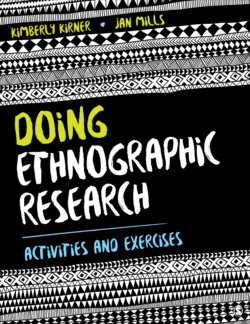Читать книгу Doing Ethnographic Research - Kimberly Kirner - Страница 12
На сайте Литреса книга снята с продажи.
About the Authors
ОглавлениеKimberly Kirner: I grew up fascinated with other cultures and nature, so I suppose it was inevitable that I would eventually become a cultural anthropologist. Yet I initially began my BS in biomedical sciences, intending to become a surgeon. While volunteering in a hospice program for terminally ill women with no surviving family, I realized I was much more interested in my patients’ stories and the impact of social systems on the human experience than I was in my patients as medical cases. I found anthropology to offer the most compelling union of social and natural sciences and switched majors. I then continued in anthropology for the rest of my student career, eventually receiving my doctorate in cultural anthropology from University of California, Riverside in 2007.
As an applied anthropologist, my research primarily focuses on using anthropological approaches, theories, and methods to work toward solving environmental problems and related issues in human well-being and health. More specifically, my research is in the application of cognitive anthropology (decision-making studies, cultural model theory, and ethnoscience) to critical policy and systems studies and to community-based or grassroots efforts at improving the lives of human and other-than-human beings. I am interested in the relationships between cultural knowledge systems and worldview, identity and community, and behavior. My research has focused on the ethnoecology of the American West and contemporary Pagans (contextualized by American political and economic systems) and issues of cultural competency for minority religious practitioners in the American healthcare system. In addition to my academic work, I work as a practicing anthropologist in organizational capacity building, program design, and program evaluation, particularly for organizations focused on mental health and social services. When not working, I can be found riding my horses, hiking, creating visual art, and reading works by mystics.
Jan Mills: As a child, I didn’t sit still but was constantly outside exploring the rural environments in which I lived. My second favorite place to be was in school, learning with fascination about the natural world around us. I became a mother at the tender age of twenty, and my learning then took a back seat to parenting, which became my new focus of learning. From community college to a four-year university and over a decade of time, I finally achieved my BA in sociology, with a heavy concentration in psychology and child development right up until my last semester, when I finally had to choose one discipline for my BA. Being aware of my talent and intuitive skills for working with children, I immediately went into the teacher credential program at California State University, San Bernardino and received such a strong education in instruction that twenty-five years later, teachers are still learning what I learned long ago.
I finished my doctorate in education at Oregon State University in 2010, having begun while working as a teacher in a first-grade classroom in a public school. My doctoral research focused on how, in my role as a teacher, I could co-create a more functional learning environment for the whole group by helping develop students’ individual capacities to self-regulate their behavioral choices (helping develop their executive functioning skills). In the role of observing participant using an ethnographic self-study approach, I conducted research on classroom management covering an entire school year, seeking to identify the most effective interventions for a large group of highly disruptive primary students with high needs. My ongoing research focuses on the dysfunctional behaviors that have increased in the classroom over the past decades, increasing in both severity and in sheer numbers of students. Though there have been periods of time when I’ve left the classroom to do administrative work in education, I’ve always felt pulled back to the elementary classroom, where children need me most. My personal interests include backpacking and hiking, reading for pleasure about current work in quantum physics, and sustaining a positive relationship with an Energy greater than myself.
